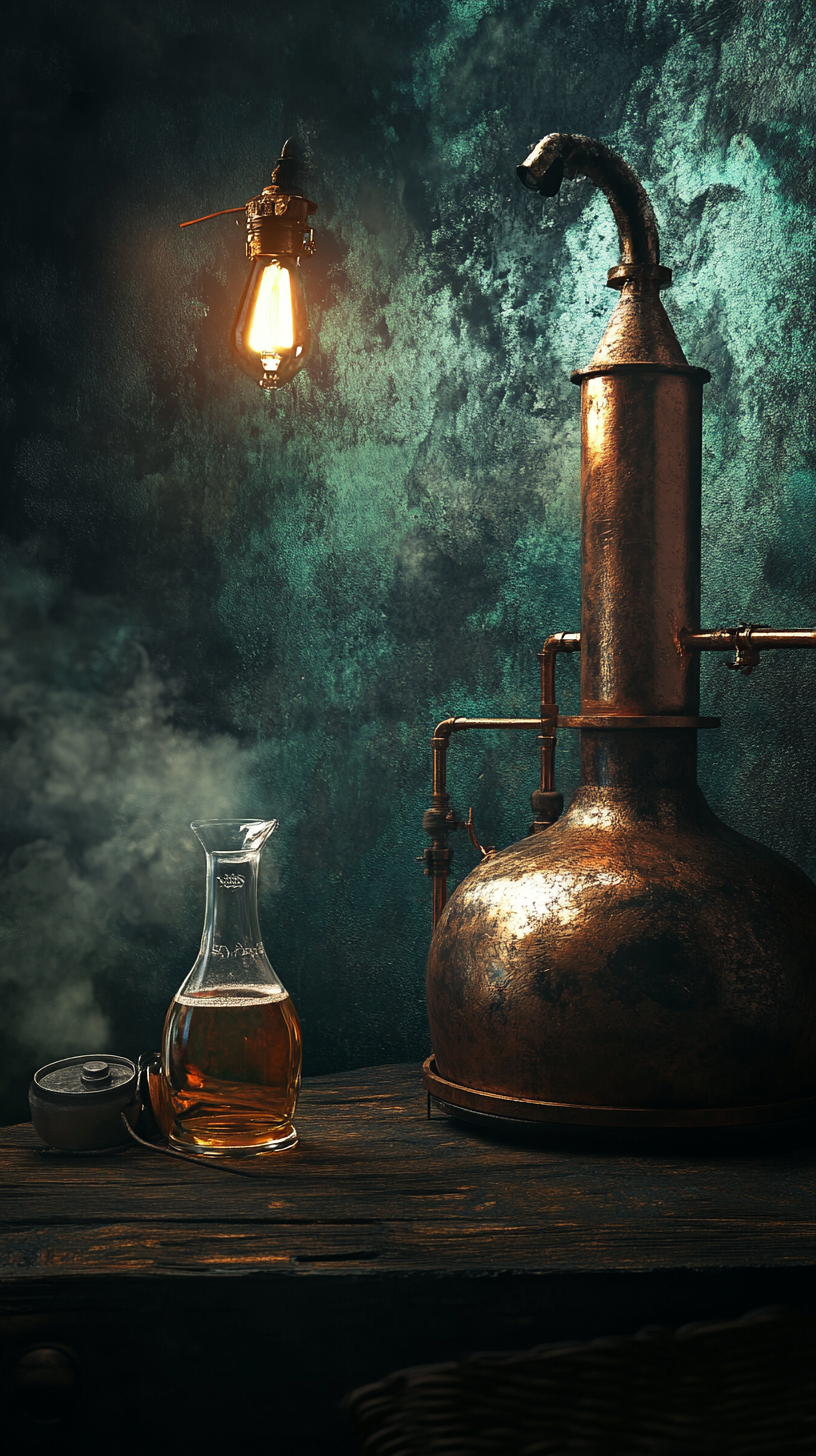Comprehensive Guide to Spirits for Sommeliers: Learning at Each Certification Level
Mastering the world of spirits is essential for sommeliers looking to broaden their expertise beyond wine. From whisky to tequila, spirits come with their own rich histories, production methods, and qualities that require in-depth knowledge.
Whether you're at the introductory stage or preparing for the Master Sommelier Diploma, understanding spirits is key to offering well-rounded beverage recommendations to guests.
This guide breaks down what you need to know about spirits at each sommelier certification level, offering learning tips and practical insights. You’ll also discover how Somm Digi AI can assist you in mastering spirits and passing your exams.
Introductory Sommelier Level: The Basics of Spirits
At the introductory level, you’ll focus on understanding the fundamental principles of distillation, production methods, and key characteristics of various spirits. This foundational knowledge will help you confidently explain different spirits to guests and make thoughtful recommendations.
Key Topics:
Principles of Distillation:
Distillation is the process of heating a liquid to create vapor and then cooling it to return it to liquid form.
This process concentrates alcohol and removes impurities, giving spirits their unique flavor profiles and alcohol content.
Scotch Whisky:
Malt & Blended Scotch: Malt whisky is made from 100% malted barley, distilled in pot stills, while blended whisky is a mix of malt and grain whiskies. Understanding the difference is key when discussing flavor profiles and quality with guests.
Irish Whiskey:
Irish whiskey is typically triple distilled, which results in a smoother and lighter spirit compared to Scotch. There are several types of Irish whiskey, including single malt, blended, and single pot still.
US Whiskey:
Learn the different types of American whiskey, including Bourbon (which must be made from at least 51% corn), Rye, and Tennessee whiskey. Each has distinct production methods and aging requirements.
Cognac:
Cognac is a type of brandy from the Cognac region in France, known for its aging process in French oak barrels. You’ll need to understand the qualities of Cognac, how blending works, and the age designations (VS, VSOP, XO).
Armagnac:
Similar to Cognac, Armagnac is a French brandy, but it is distilled using a continuous still, resulting in a more rustic, fuller-bodied spirit. Learn the different qualities, aging methods, and blending practices.
Calvados:
This apple or pear-based brandy from Normandy, France, is known for its fruity flavors. Understanding Calvados’ production and aging (in oak casks) will help when recommending this spirit.
Tequila:
Tequila is made from blue agave, primarily in the Jalisco region of Mexico. Familiarize yourself with the different styles: Blanco (unaged), Reposado (aged up to a year), and Añejo (aged 1-3 years).
Gin:
A neutral spirit flavored with botanicals, primarily juniper. Learn about its distillation process and the differences between London Dry, Old Tom, and other gin styles.
Vodka:
Vodka is a neutral spirit, typically distilled multiple times to remove impurities. It can be made from grains, potatoes, or other raw materials and is known for its clean, pure flavor.
Rum:
Made from sugarcane or molasses, rum can range from light to dark, depending on its aging process. Learn the difference between white rum, golden rum, and dark rum.
Key Terms in Production:
Familiarize yourself with common terms used in spirit production, such as pot still, column still, fermentation, and maturation.
Learning Tips:
Taste Different Spirits: Try a variety of spirits across all categories to understand the differences in flavor, aging, and production.
Use Somm Digi AI: Ask it questions like "What is the difference between single malt and blended Scotch?" or "How does the distillation process affect the flavor of gin?" for a deeper understanding.
Certified Sommelier Level: Diving Deeper into Spirit Types
At the certified level, you’ll need to recognize specific types of spirits within broader categories, as well as explore more unique spirits like mezcal and eau de vie.
Key Topics:
Identify Specific Spirit Types:
Islay Whisky: Known for its heavily peated, smoky flavors, Islay whisky comes from Scotland’s Islay region. Understanding the regional characteristics will help when recommending whisky to guests who enjoy bold flavors.
Fine Champagne Cognac: This Cognac comes from a blend of eaux-de-vie from the Grande Champagne and Petite Champagne regions, offering high-quality and complex flavors.
Armagnac: Study specific areas of production within Armagnac, such as Bas-Armagnac, known for producing the finest Armagnac.
Marc/Grappa: Marc (French) and Grappa (Italian) are spirits made from grape pomace, the leftover skins, seeds, and stems after winemaking. These are rustic, flavorful spirits often enjoyed after a meal.
Tequila & Mezcal: Learn the differences between Tequila and Mezcal. Mezcal is made from various agave species and tends to have smoky, earthy flavors due to its traditional production methods.
Eau de Vie: These are clear fruit brandies made from fermented fruit, known for their purity and delicate fruit aromas.
Learning Tips:
Compare Similar Spirits: Taste different styles of whisky (like Islay vs. Highland) or compare Tequila with Mezcal to refine your palate.
Use Somm Digi AI: Ask it questions like "What distinguishes Islay whisky from other Scotch whiskies?" or "What are the key differences between Tequila and Mezcal?" to enhance your knowledge.
Advanced Sommelier Level: Mastering Complex Spirits
At the advanced level, you’ll explore more nuanced and detailed topics, including flavored spirits, specific production methods, and well-known producers.
Key Topics:
Flavored Spirits:
Pastis, Ouzo, Raki, Akvavit: Learn the production methods and cultural significance of these anise-flavored spirits, popular in Mediterranean and Scandinavian countries.
Flavored Vodkas: Understand how natural or artificial flavorings are added to vodka and how these spirits are used in cocktails.
Fruit Eaux-de-Vie:
Study the different types of fruit eaux-de-vie, such as pear (poire) or raspberry (framboise), and understand their production techniques.
Marc & Grappa:
Explore the production methods and regional variations of Marc and Grappa, learning how they are distilled and aged.
Mezcal:
Dive deeper into mezcal production, focusing on artisanal methods like roasting agave in underground pits, which gives the spirit its distinctive smoky character.
Principal Spirit Producers:
Learn about key producers in each category, such as Glenfiddich for Scotch, Hennessy for Cognac, and Patron for Tequila.
Learning Tips:
Focus on Production Details: Study technical aspects of spirit production, such as distillation methods and aging processes.
Use Somm Digi AI: Ask complex questions like "What are the traditional production methods for Mezcal?" or "How is fruit eau-de-vie made?" to solidify your understanding.
Master Sommelier Diploma Level: Comprehensive Expertise in Spirits
At this level, you are expected to have a thorough understanding of all aspects of spirits, from production techniques to brand knowledge, regulations, and styles. This will allow you to recommend the finest spirits to guests and discuss them in detail.
Key Topics:
Rum Production & Principal Types/Producers:
Explore how rum is produced in different regions, from light, column-distilled rums in Puerto Rico to pot-still Jamaican rums. Study major producers like Bacardi, Mount Gay, and Appleton Estate.
Eastern European Spirits:
Learn about spirits like palinka (Hungary), rakija (Balkans), and slivovitz (Eastern Europe), understanding their cultural significance and production methods.
Fruit Eau de Vie Production:
Study how fruit-based spirits are made in different countries, and learn the names used in various regions (e.g., Kirschwasser in Germany for cherry eau-de-vie).
Technical Production Details of Major Spirit Brands:
Be able to explain the technical production methods of well-known spirits brands, such as the distillation process for Grey Goose vodka or the aging methods used by Macallan whisky.
Regulations Regarding Production:
Understand the legal regulations governing spirit production, such as the requirements for a product to be labeled Bourbon or Cognac.
Location of Distilleries (Scotland):
Know the geographical locations of major distilleries in Scotland, such as those in the Highlands, Islay, and Speyside, and how location impacts the flavor of the whisky.
Styles & Aging Requirements of Principal Spirit Types:
Be well-versed in the different styles and aging requirements for all major spirits, including whisky, brandy, rum, and tequila.
Learning Tips:
Research Key Producers: Study the history and production techniques of major spirit producers to better understand their products.
Use Somm Digi AI: Ask advanced questions like "What are the aging requirements for different types of rum?" or "What makes a spirit qualify as Cognac?" to enhance your mastery.
Conclusion: How Somm Digi AI Can Help at Every Level
Somm Digi AI can be an invaluable tool for studying spirits, whether you're just learning the basics or preparing for the Master Sommelier exam. With AI-powered insights, you can easily clarify complex topics, compare production methods, and deepen your understanding of various spirits.
Example AI Prompt for Each Level:
Intro Level: "What is the difference between Bourbon and Rye whiskey?"
Certified Level: "What are the key characteristics of Fine Champagne Cognac?"
Advanced Level: "How is Ouzo different from Raki?"
Master Diploma Level: "What are the regulations for labeling a whisky as Scotch?"
By following this guide, you’ll be well-equipped to master spirits at every sommelier level, allowing you to provide exceptional recommendations and insights to your guests.



